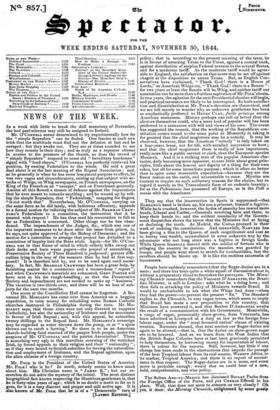People have suddenly remembered that the Sugar-duties are in a
mess ; and there has been quite a white squall of discussion about it, without a preparatory cloud to foretoken the paroxysm. The Morn- ing Chronicle remembers that the Viscount D'ABRANTES, the Brazi- lian Minister, is still in London ;' asks what he s doing here ; and then falls to attacking the policy of Ministers towards Brazil. It would be uncharitable to ask what the Whigs had done—when they had the power—to prevent the present " fix." The Standard .replies to the Chronicle, in very vague terms, which seem to imply that Brazil has made a new proposition to this country, that Ministers' have answered it, and that Senhor D'AtatesixEs awaits the result of a communication with his Government. Meanwhile, a cargo of sugar, presumably slave-grown, from Venezuela, has been admitted at Liverpool at a duty as low' as the foreign free- labour sugar, under the" most favoured nation" clause of existing treaties. Rumours abound, that next session our Sugar-duties Ire again to be altered,—that is, that the dutiee on slave-grown sugar are lobe lowered. And as we learn from the West Indies that the British' Sugar Colonies have at last been graciously permitted to help themselves, by berrowing money for importation of labour, there is colour for the reports. Still, however, but little if any change has been made in the obstructions that imp,ede the passage of the best Tropical labour from its real source, Western Africa, to its market, Tropical America ; and there is no report of amend- ment in that respect. The Sugar-duties are in a mess, and some move is probable enough : would that we could hear of a new, bold, comprehensive, and wise policy.


























